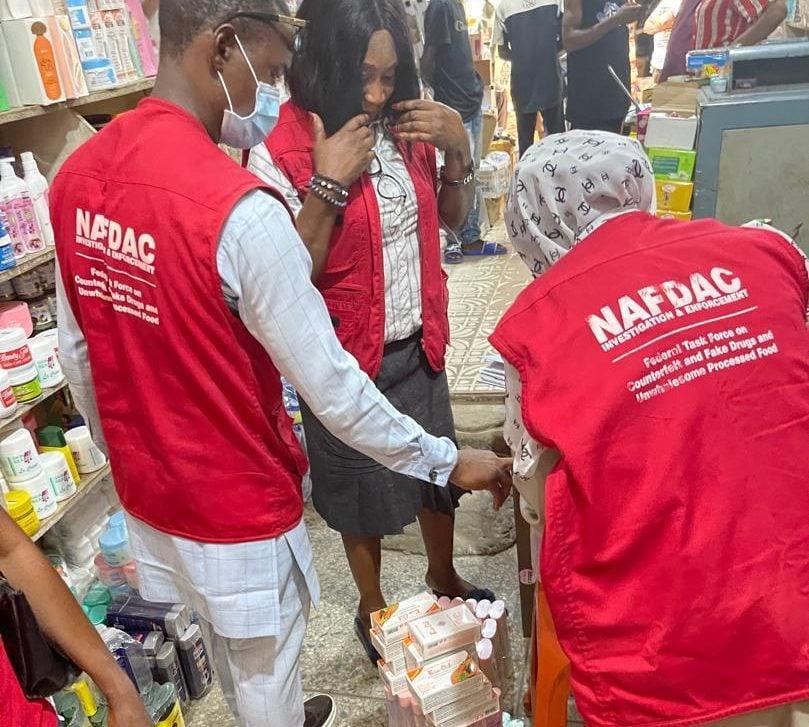On the surface, they appear as neat and colourful rows of cosmetics and medicine jars promising glowing beauty and health. But hidden behind the labels were toxins, expired chemicals, and untested formulas capable of doing irreparable harm.
In Nigeria, however, danger doesn’t always arrive with a warning sign.
Somewhere in a warehouse in Lagos, a mother might unknowingly pick up a baby lotion laced with carcinogens, while a pharmacy in Port Harcourt might stock antimalarial tablets that never cure a fever.
In a sweeping crackdown, the National Agency for Food and Drug Administration and Control (NAFDAC) confiscated over ₦1.5 billion worth of expired products from the Lagos Trade Fair Market.
The operation uncovered entire warehouses stacked with cosmetics and food items, many of which had been smuggled into the country.
In a parallel bust in Port Harcourt, NAFDAC intercepted 16 containers of unregistered products valued at over ₦20.5 billion.
These seizures reveal a thriving network of illegal distribution and importation that threatens both public health and national security.
Across Africa, counterfeit drugs alone have been linked to hundreds of thousands of preventable deaths.
In Nigeria, where access to healthcare reamins limited for many, having these medications in circulation undermines trust in medical systems and delays timely treatment.
Less than 5% of Nigerians are registered under the NHIS, with 70% still paying for their healthcare individually.
But the risks are far-reaching. Cosmetics made with chemical agents like mercury and hydroquinone (classified as carcinogenic) can result in skin damage and liver dysfunction, including long-term hormonal troubles.
These latest seizures also expose systemic vulnerabilities. Under Nigeria’s food and drug safety laws, some of these cases could attract jail terms, but legal bottlenecks often hamper prosecution.
Nigeria’s porous ports allow for these illegal imports to slip through inspections. Traders, motivated by profit, sometimes bypass NAFDAC’s registration process entirely, stamping fake labelling on these products and forging clearance documents.
The rise of new detection technologies and public-education campaigns suggests that the agency is expanding its enforcement. It has even adopted a two-tiered approach of visual screening and chemical analysis to flag high-risk products before they get on the market.
Analysts, however, argue that enforcement alone won’t be enough. Nigeria’s consumer goods ecosystem needs a structural overhaul. There must be closer collaboration between regulators, port authorities, market unions and security agencies.
Public-awareness campaigns must shift from sleek billboards to rural markets where buyers are most vulnerable.
There’s also the economic dimension. Counterfeit markets undercut legitimate businesses, erode investor confidence and syphon billions away from Nigeria’s formal economy. If unchecked, these losses could affect everything from employment to foreign trade relationships.
On the brighter side, the scale of recent seizures and their visibility may signal a turning point. Consumer advocacy groups have praised NAFDAC’s actions and called for tougher penalties and public disclosure of convicted offenders.
Still, sustaining these victories is crucial for the agency’s war against fake products. Warehouses once sealed must not reopen under new names. Market surveillance must be constant, and enforcement budgets must be protected.
Above all, the agency must guard against vandalism, internal collusion, or corruption, which could sabotage even the best-designed operations.
The war against counterfeit and expired products saves not just a life. It protects a country.
In Nigeria, a significant problem is the presence of counterfeit and expired cosmetics and drugs, which pose serious health risks, such as skin damage, liver dysfunction, and even preventable deaths. Notably, these products are often stocked in various markets, such as pharmacies in Port Harcourt and Lagos, where a recent NAFDAC operation seized ₦1.5 billion worth of expired goods and ₦20.5 billion worth of unregistered products. These actions reveal a widespread network of illegal importation facilitated by Nigeria's porous borders, a lack of strict enforcement, and a drive for profit.
Less than 5% of Nigerians have health insurance, with most paying out of pocket for healthcare, which exacerbates the public health crisis. Legal and infrastructural challenges further complicate the prosecution of offenders, with the need for systemic overhaul and collaborative efforts among regulators, port authorities, and consumers. Enhancing detection technologies, expanding public education to rural areas, and economic reforms are vital steps.
Despite these challenges, recent actions by NAFDAC have brought hope and may mark a turning point in the fight against counterfeit goods. Increased consumer advocacy supports stricter penalties and public transparency regarding offenders. Sustaining these efforts is crucial to protecting public health, the economy, and the nation's wellbeing.






